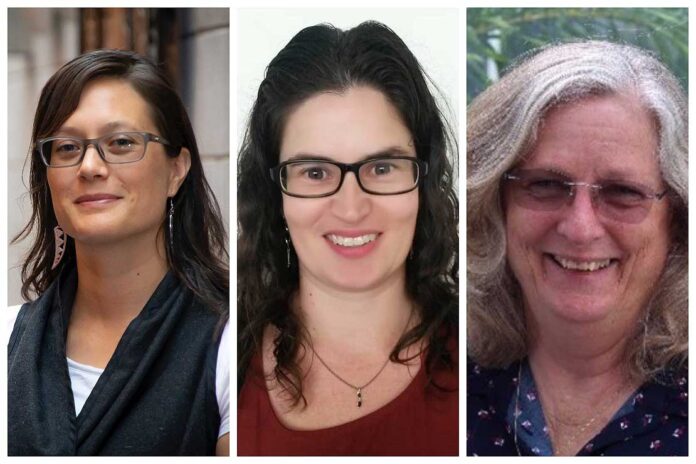Source: Massey University
Dr Felicity Ware, Dr Andrea Donaldson and Associate Professor Clare Harvey
Māori infant and maternal health, supporting vocational rehabilitation and developing a strangulation screening tool for first responders are three areas of research that have been recognised in the latest round of the Health Research Council of New Zealand (HRC) Research Activation Grants.
The grants provide support to enable established or prospective researchers and/or research providers wanting to improve patient care and healthcare systems in New Zealand.
Dr Felicity Ware, Associate Professor Clare Harvey and Dr Andrea Donaldson have all received a grant valued up to $30,000 to support their research over the coming year.
Dr Felicity Ware – Te Putahi-a-Toi, College of Humanities and Social Sciences
Dr Ware’s grant will help to establish a Māori infant and maternal health research group Te Aukume a Hine te Iwaiwa: Health of Māori Māmā and Pēpi over the next six months in order to support more Māori-led research and collaboration with Māori health professionals and whānau.
She says the need for the establishment of a national multidisciplinary group was progressed by attendees at a recent workshop at Auckland Hospital.
The group aims to develop an evidence base of what works for Māori to inform better planning of research for maternal, infant, and whānau health services that promote hauora (Māori view of health and wellbeing) to equip mama and pēpi for the best start in life.
Dr Ware says, “Rangahau [research] for Māori is about relationships, so this funding provides the first step to hui and wānanga to develop whanaungatanga [close connection] between Māori researchers, health professionals and whānau. This collaborative approach will naturally produce tuakana-teina [reciprocal relationship between an older or more experienced/knowledgeable (tuakana) person and a younger or less experienced/knowledgeable (teina) person]
relationships that will help to mentor emerging Māori researchers. Strong links with the Maori birthing community will ensure Māori needs and aspirations are reflected in the research in order to reduce the significant inequities experienced by Māori, and improve outcomes.”
Dr Andrea Donaldson – School of Nursing, College of Health
Dr Donaldson’s research entitled Developing a strangulation screening tool from frontline responders knowledge investigates New Zealand’s problem with family violence and strangulation.
Police records show 1246 charges of strangulation were laid after becoming a separate offence in December 2018 – amounting to almost five arrests a day. Strangulation characteristically leaves few marks or signs, which presents a unique challenge for health professionals to recognise the health consequences that come from non-fatal strangulation.
The funding grant will support a scoping review of international literature and a survey of front-line responders perceptions and knowledge around health consequences when they provide care for someone who has suffered non-fatal strangulation.
Dr Donaldson will then create a larger study that will ultimately develop the screening tool to support change in both policy and practice delivery in the treatment and management of non-fatal strangulation in intimate partner violence and sexual assault situations.
Dr Donaldson says she feels very honoured to have been the recipient of the HRC activation grant as it will enable her to address one of the biggest silent epidemics in New Zealand.
“Research shows that the risk of brain injury from non-fatal strangulation is significantly higher than the risk of contact sports and military action in terms of absolute numbers and is not acknowledged or well addressed in the health fields. As a lecturer, who is a registered nurse with a PhD in forensic science, it is vital that we promote an open and active conversation around the impacts of strangulation and to be able to screen for and treat appropriately to prevent further harm.”
Associate Professor Clare Harvey – School of Nursing, College of Health
This funding supports a pilot project, Supporting lifestyle change and vocational rehabilitation, the findings from which will be used to establish a foundation for the development of a programme that supports people living with chronic conditions to improve their lifestyle and vocational opportunities.
The pilot study follows one young man who has significant chronic conditions, on his journey to rehabilitation. This work compliments that of other research being conducted by Dr Harvey and her team, that is looking at different ways of ensuring that people living with long term conditions are part of the health team in planning their care, and are achieving their health goals through self-determination and collaboration.
Dr Harvey will draw on findings from the pilot study to develop a research proposal to implement the programme into wider communities.
Related articles
Funding boost to enhance Māori mental health outcomes
Healthier Lives grant to research prevention programme for diabetes
Massey awarded three prestigious Fellowships from Health Research Council
Health grants for Massey research on COVID-19
Created: 16/07/2021 | Last updated: 16/07/2021



